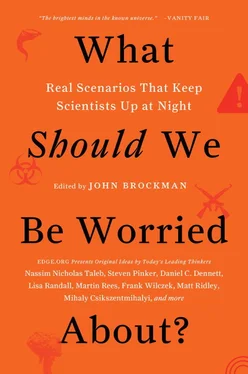I studied Human Sciences in Oxford in the 1970s, which some people joked was right in the middle of the Banbury Road, the Department of Social Anthropology being on one side and the Department of Biological Anthropology on the other. The Human Sciences students felt like bilingual children, who could not only switch between the two cultures when appropriate but automatically thought about topics in a multidisciplinary way, even if their academic “parents” in each department rarely crossed the road to learn about the other’s culture. I would like to think we’ve come a long way and that there is now rich interchange between disciplines, at least in the study of human behavior.
But I worry that the gap between C. P. Snow’s two cultures has in some areas remained as wide as ever and may even have widened. By way of illustration, consider the field of sex differences in the mind. My own view is that research into sex differences teaches us two things: First, one cannot infer what kind of mind a person will have purely on the basis of their gender, since an individual may be typical or atypical of their gender. Indeed, to do so would be stereotyping and sexist. Second, where one finds sex differences on average when comparing groups of males and groups of females, these differences are likely to reflect a mix of causal factors, from parenting styles and peer-group influences to the amount of testosterone the fetus produces in the womb and the effects of sex-linked genes.
However, even today one still finds academics claiming that there are no universal sex differences in, for example, language—on the grounds that any sex differences in language and communication are either culture-specific or do not replicate. Such claims effectively reduce sex differences in language to peculiarities of a particular culture or a particular experiment, thereby needing no reference to biology. While I would agree that the similarities in men’s and women’s conversational styles are greater than are the differences, when it comes to children’s language acquisition my reading of the evidence is that the differences, on average, between boys’ and girls’ language development are nontrivial and likely to be universal. Here are just two pieces of experimental evidence.
First, girls typically show faster growth in vocabulary size than boys. This is seen in a large Russian study of 550 girls and 487 boys, aged 18-36 months, mirroring patterns found in a different culture, England. Second, boys’ rate of stuttering and other speech problems is at least twice as high as that of girls. This is revealed in an even larger data set from the National Survey of Children’s Health, which sampled more than 91,000 children aged three to fourteen across the United States, including children of different ethnic backgrounds. Social determinists might want to take the data from such studies and try to explain it purely in terms of postnatal experience, but since mutations in genes (such as GNPTAB and CNTNAP2) have been associated with stuttering and language impairment, it’s likely that individual differences in typical language development (including typical sex differences) will also turn out to have a partly genetic basis.
No one denies the important role that experience and learning play in language development. What worries me is that the debate about gender differences still seems to polarize nature vs. nurture, with some in the social sciences and humanities arguing that biology plays no role at all, apparently unaware of the scientific evidence to the contrary. If he were still alive today, C. P. Snow might despair, as I do, that despite efforts to communicate the science to a wider public, the field of sex differences remains a domain where the two cultures are separated by a deep chasm.
THE UNAVOIDABLE INTRUSION OF SOCIOPOLITICAL FORCES INTO SCIENCE
NICHOLAS A. CHRISTAKIS
Physician, social scientist, Harvard University; coauthor (with James Fowler), Connected: The Surprising Power of Our Social Networks and How They Shape Our Lives
I am not really worried about the bad things science might do to society. I’m happy to put aside fears about nuclear power, genetically modified foods, or even the publication of viral genetic sequences. Instead, I’m much more worried about the bad things society might do to science, and I think we should all be.
Lately, I’ve been seeing a lot of alarming and nonbeneficial interventions by government in science—laws prohibiting the Centers for Disease Control and Prevention from analyzing the epidemiology of gun violence; laws requiring the teaching of “intelligent design” to our children; laws governing stem-cell science; laws affecting climate science. Politicians and pundits take to the Internet and television, like priests of old, to denounce science in ways that sound almost medieval to my ears.
Of course, ever since the Inquisition summoned Galileo, social, political, and religious considerations have affected the conduct of science. Actually, ever since Archimedes was paid to design weapons of war, social considerations have had this effect. Indeed, we can trace such effects as far back as we have records. It has always been the case that social forces have shaped scientific inquiry—what we study, how we study, why we study, who gets to study.
Nevertheless, though science has always been “socially constructed,” this fact has been explicitly characterized only in the last few decades. We can now understand how scientists of centuries past could hold views (and even make “objective” observations) that were not only clearly wrong but also clearly driven by ideology or culture. Views ranging from the phrenological causes of crime to the medical diagnosis of escaped slaves as suffering from the disease of “drapetomania” have all been given a scientific gloss.
But we should be really worried about this age-old and unavoidable intrusion of sociopolitical forces at the present historical moment, because our health, security, and wealth depend so much on progress in science and in ways not appreciated widely enough. How we shape science affects our collective well-being. The key driver of economic growth may well be our cumulative growth in knowledge. Science and invention make us richer, and the pace of scientific discovery has been surging for the last 200 years, coincident with, or causally in advance of, economic growth.
Hence, we should pay attention when science (and science education) becomes a plaything of politicians, or when scientists come to be seen like any other interest group (the same as farmers or bankers) rather than as something altogether different. We should be worried that political interference in, and even antipathy to, science harms us all. I’m not suggesting that scientists should be cut off from society, free from moral scruples or collective oversight. But seeing science as arbitrary or threatening and scientists as (merely) self-interested—and using these excuses to restrict scientific inquiry or distort scientific findings—is dangerous.
A discomfiting irony here is that more government support and societal oversight are needed, given changes in how science is done in the 21st century. Long gone are the days when lone scientists with modest resources (Newton, Darwin, Curie, Cavendish, Cox) could make major discoveries. Doing the best science increasingly requires large-scale resources and interdisciplinary teams. We have no choice but to rely on broad social support and the public purse if we are to do our work. So political considerations are unavoidable. We don’t want—nor could we even have—unfettered, unexamined, unchecked, or insular scientific inquiry.
So there’s no way out of the conundrum. To those who want it both ways—who want the public to support science but also to butt out—my answer is yes, I do, too, very much. We should all be worried if politicians and the public lose sight of the fact that scientific inquiry is a public good.
Читать дальше












